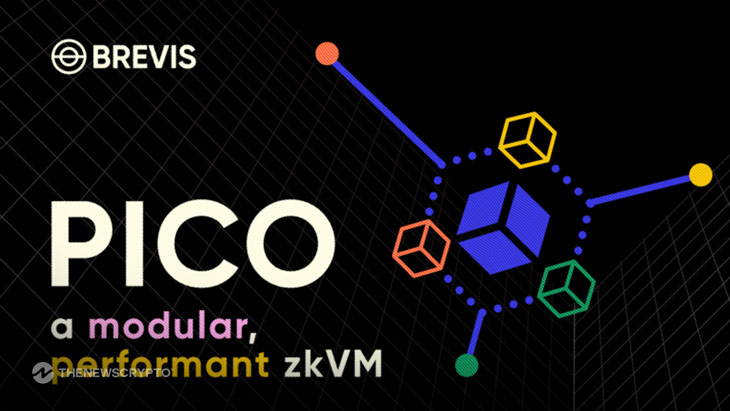Brevis has unveiled Pico v1.0, a zero-knowledge virtual machine (zkVM) intended for flexible and modular verifiable computing. Applications now have complete control over how zero-knowledge proofs are created and optimized thanks to Pico, the first zkVM that gives developers the ability to alter prime fields, proving systems, proving systems, app-level coprocessor interfaces, and access to historical on-chain data.
In contrast to the one-size-fits-all strategy of standard zkVM, Pico builds zkVMs in a modular fashion, offering a flexible architecture that achieves the fastest performance on CPU, outperforming the next best solution by 84% to 155%. Future Pico upgrades will provide GPU acceleration. As a result, dApps and on-chain protocols have a zkVM that maximizes trustlessness, expressiveness, and efficiency.
A general-purpose zkVM and high-performance specialized circuits are combined in Pico’s modular “glue-and-coprocessor” design to provide adaptable proving fields, systems, and processes. In contrast to conventional zkVMs that depend on low-level precompiles, Pico provides circuits that are specialized to different applications.
Using built-in features or bespoke implementations, developers may include custom circuits as coprocessors or precompiles. This solution drastically cuts down on proof generation time by increasing speed for processing previous blockchain data by 35X.
Developers may use Pico to create domain-specific proving structures that match proofs to bespoke proof systems or specialized languages. For the first time, prime fields and proving systems may be customized without changing the code in a zkVM. This adaptability improves zero-knowledge cryptography by maximizing efficiency, speed, and proof size.
Michael Dong, Co-founder of Brevis stated:
“Pico represents a shift in how zkVMs are designed and deployed. Bringing a modular, app-aware zkVM with built-in zkCoprocessors, we’re optimizing performance and creating a never before seen level of customization in verifiable computation for Web3.”
Additionally, Pico implements a customized proving workflow called ProverChain. This customizable sequence creates a proof to verify a statement, enabling developers to optimize proving stages for cost and scalability, optimize proof production for speed, memory, or size, and avoid needless proof compression in off-chain verification scenarios.
Because Pico supports Rust, a systems programming language that prioritizes safety and speed, and RISC-V, an open-source instruction set architecture with a modular design, developers may create zk apps using well-known development settings. Several Web3 protocols and dApps, including Kwenta, Usual, Algebra Labs, JoJo Exchange, and Trusta, have already introduced Brevis-powered features on the mainnet. Numerous others, including PancakeSwap, Celer, Frax, Gamma, Quickswap, Mask Network, Kernel, Thena, Kim Protocol, 0G, Bedrock, Mellow Finance, ZettaBlock, Hemera, and Mendi Finance, are developing Brevis-powered next-generation products and features.
Existing smart contract blockchains can now handle limitless computation capacity thanks to Brevis, an effective and verifiable off-chain computation engine. Brevis uses zero-knowledge proofs to transfer expensive, data-intensive computations from on-chain enviroments to a much cheaper off-chain engine. This allows Web3 applications to grow without interruption while maintaining the security of L1 trust assumptions.








